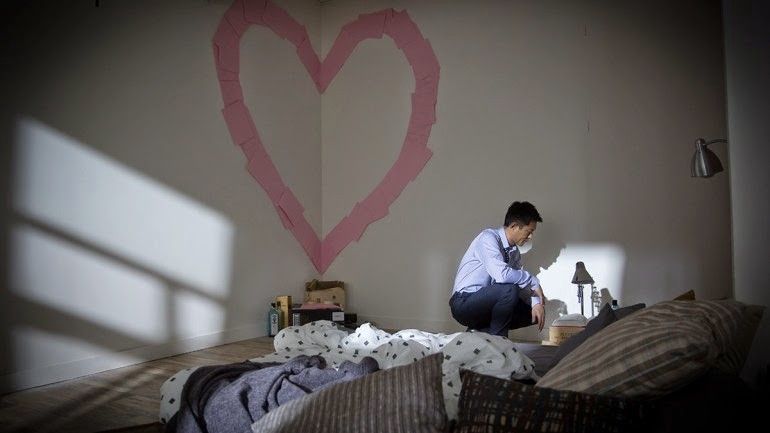Don’t Go Breaking My Heart 2 (Johnnie To, 2014)

Beginning one year after the first film ends, financial analyst Cheng Zixin (Gao Yuanyuan) is still engaged to the winner of that film’s love triangle, reformed alcoholic Qihong (Daniel Wu) (recall that for her he quit drinking and built a skyscraper in the shape of her silhouette). They communicate only via Skype, however, as Wu is back in Suzhou putting the finishing touches on his/her building. The loser of the earlier battle, wealthy playboy financier Cheung Shen-ren (Louis Koo), is back to his womanizing ways, sleeping with any woman whose breasts are big enough to give him a nose bleed. Zixin gets a new job working for Yang Yang-yang (Miriam Yeung in the film’s most brilliant performance) and in the meantime shops for wedding dresses with her brother, Paul (Vic Chou). Yeung and Koo are rivals who quickly begin dating (as the story begins they open new offices in opposing skyscrapers, they flirt through the windows as Koo and Gao did in the first film), while Yeung is also wooed by Chou and Koo secretly is still in love with Gao while also sleeping with other random women. The relationships inevitably entangle in a screwball series of mistaken identities, twists, and physical assaults, culminating in a climax that at long last unites The Graduate and Safety Last.
The sequel builds on the first film in several ingenious ways, doubling and inverting just about everything from its predecessor. More romantic than comic, if the first film had a flaw, it was that it was so sweetly, almost innocently joyous in its cuteness. Koo and Wu chase after Gao with increasingly implausible displays of charm and conspicuous consumption, the luxury world the characters inhabit blissfully untouched by the economic catastrophe of 2008 that launches the film’s plot (as such, it is a companion piece to To’s other film from 2011, Life Without Principle which looks explicitly at the fallout from the collapse from the perspective of a cop, a gangster, and a low-level banker). The sequel raises the price tag while further disassociating its characters from reality (only once does Gao take public transportation this time around, and only to prove a point, rejecting both Yeung’s Ferrari and Koo’s Maserati). Central to the inversion is a trope Yeung’s character introduces, that of “reverse thinking”. She hires Gao because she’s wrong about a prediction, as being consistently wrong is just as valuable as being consistently right, ably demonstrated by an octopus Yueng and Chou steal from a seafood restaurant (doubling the legs of the totemic animal from the first film, Wu’s pet frog). This is a film about people who constantly make bad decisions, who always do the opposite of what they should.
The sweetness of the first film gradually gives way to a deep, uncertain melancholy. In one of the film’s first crushing reveals we see that Koo still watches the video he took of Gao dancing in the first film, projecting it on a wall every night accompanied by the sickly sweet love ballad she’s silently singing–it’s the only way he can get to sleep. The past haunts him and destroys him. Koo is aging gracefully as an actor, and his weariness and dawning realization that his playboy life is nothing but pathetic (on the heels of a perfect storm of flight attendants) goes a long way toward humanizing a nearly impossible character. Koo is the most dramatic example, but the film reveals layers of darkness, self-hatred, and lunacy within each of its principals. When the ending comes, it isn’t the grand triumph of the first film, with Koo and Wu exchanging smiles and a friendly “thumbs-up”, it’s a world-shattering smash, the most powerful final shot since Abbas Kiarostami’s Like Someone in Love.
Much has been made in early reviews of the film after its premiere at the Toronto Film Festival about its visual “flatness” and the fact that for the first time in quite awhile, cinematographer Cheung Siu-keung is not credited, with To Hung-mo instead taking the reins. This coincides with the film being shot digitally, a first for To, if I’m not mistaken. Well, To Hung-mo is no guy just off the street, having been in the camera department at Milkyway Image since 1998 and serving as co-DP with Cheung on Vengeance and Romancing in Thin Air as well as the first Don’t Go Breaking My Heart. For sure the film is not as wildly shot as To’s earlier comedies, which tend to use space-distorting lenses and unusual setups. The aesthetic here though is one of surfaces and reflections, necessarily flat images. The windows of the opposing skyscrapers are used much more creatively, expanding their Rear Window stages (increasing the size of the office window panes, the aspect ratio is doubled and tripled) transparent and opaque as needed, even in one glorious shot reflecting each other back in on themselves like an impenetrable hall of mirrors. Similarly flat and digital are the films the characters are always creating of each other with their phones (love objects for Koo and Chou, a necessary form of communication for Gao, both with Wu and her sidekick Lam Suet). The wide angles and swooping cranes of My Left Eyes Sees Ghosts would be wholly inappropriate here, in this world so glossy, so phony, so blindingly manufactured. It’s a movie about straight lines: ups and downs and parallel parking.
